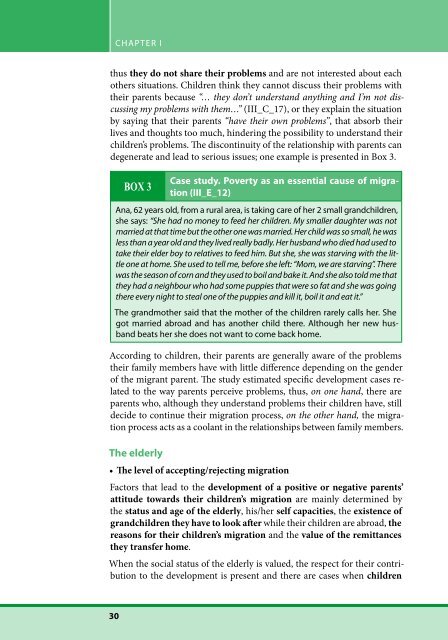specific needs of children and elderly left behind as a ... - IOM Moldova
specific needs of children and elderly left behind as a ... - IOM Moldova
specific needs of children and elderly left behind as a ... - IOM Moldova
You also want an ePaper? Increase the reach of your titles
YUMPU automatically turns print PDFs into web optimized ePapers that Google loves.
CHAPTER I<br />
thus they do not share their problems <strong>and</strong> are not interested about each<br />
others situations. Children think they cannot discuss their problems with<br />
their parents because “… they don’t underst<strong>and</strong> anything <strong>and</strong> I’m not discussing<br />
my problems with them…” (III_C_17), or they explain the situation<br />
by saying that their parents “have their own problems”, that absorb their<br />
lives <strong>and</strong> thoughts too much, hindering the possibility to underst<strong>and</strong> their<br />
<strong>children</strong>’s problems. The discontinuity <strong>of</strong> the relationship with parents can<br />
degenerate <strong>and</strong> lead to serious issues; one example is presented in Box 3.<br />
BOX 3<br />
C<strong>as</strong>e study. Poverty <strong>as</strong> an essential cause <strong>of</strong> migration<br />
(III_E_12)<br />
Ana, 62 years old, from a rural area, is taking care <strong>of</strong> her 2 small gr<strong>and</strong><strong>children</strong>,<br />
she says: “She had no money to feed her <strong>children</strong>. My smaller daughter w<strong>as</strong> not<br />
married at that time but the other one w<strong>as</strong> married. Her child w<strong>as</strong> so small, he w<strong>as</strong><br />
less than a year old <strong>and</strong> they lived really badly. Her husb<strong>and</strong> who died had used to<br />
take their elder boy to relatives to feed him. But she, she w<strong>as</strong> starving with the little<br />
one at home. She used to tell me, before she <strong>left</strong>: “Mom, we are starving”. There<br />
w<strong>as</strong> the se<strong>as</strong>on <strong>of</strong> corn <strong>and</strong> they used to boil <strong>and</strong> bake it. And she also told me that<br />
they had a neighbour who had some puppies that were so fat <strong>and</strong> she w<strong>as</strong> going<br />
there every night to steal one <strong>of</strong> the puppies <strong>and</strong> kill it, boil it <strong>and</strong> eat it.”<br />
The gr<strong>and</strong>mother said that the mother <strong>of</strong> the <strong>children</strong> rarely calls her. She<br />
got married abroad <strong>and</strong> h<strong>as</strong> another child there. Although her new husb<strong>and</strong><br />
beats her she does not want to come back home.<br />
According to <strong>children</strong>, their parents are generally aware <strong>of</strong> the problems<br />
their family members have with little difference depending on the gender<br />
<strong>of</strong> the migrant parent. The study estimated <strong>specific</strong> development c<strong>as</strong>es related<br />
to the way parents perceive problems, thus, on one h<strong>and</strong>, there are<br />
parents who, although they underst<strong>and</strong> problems their <strong>children</strong> have, still<br />
decide to continue their migration process, on the other h<strong>and</strong>, the migration<br />
process acts <strong>as</strong> a coolant in the relationships between family members.<br />
The <strong>elderly</strong><br />
• The level <strong>of</strong> accepting/rejecting migration<br />
Factors that lead to the development <strong>of</strong> a positive or negative parents’<br />
attitude towards their <strong>children</strong>’s migration are mainly determined by<br />
the status <strong>and</strong> age <strong>of</strong> the <strong>elderly</strong>, his/her self capacities, the existence <strong>of</strong><br />
gr<strong>and</strong><strong>children</strong> they have to look after while their <strong>children</strong> are abroad, the<br />
re<strong>as</strong>ons for their <strong>children</strong>’s migration <strong>and</strong> the value <strong>of</strong> the remittances<br />
they transfer home.<br />
When the social status <strong>of</strong> the <strong>elderly</strong> is valued, the respect for their contribution<br />
to the development is present <strong>and</strong> there are c<strong>as</strong>es when <strong>children</strong><br />
30

















